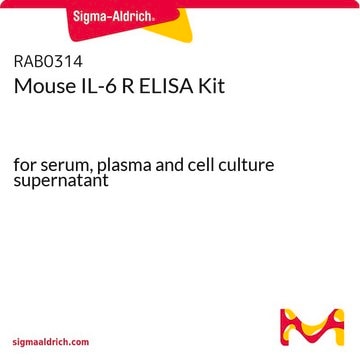B1645
Anti-Bovine IgG (whole molecule) antibody produced in goat
whole antiserum
Sign Into View Organizational & Contract Pricing
All Photos(1)
About This Item
Recommended Products
biological source
goat
conjugate
unconjugated
antibody form
whole antiserum
antibody product type
secondary antibodies
clone
polyclonal
contains
15 mM sodium azide
technique(s)
quantitative precipitin assay: 2.8 mg/mL
shipped in
dry ice
storage temp.
−20°C
target post-translational modification
unmodified
General description
IgG antibody subtype is the most abundant of serum immunoglobulins of the immune system. It is secreted by B cells and is found in blood and extracellular fluids.
Specificity
The antiserum shows a single arc of precipitation versus bovine serum and bovine IgG by immunoelectrophoresis (IEP). This antiserum has not been assayed for interspecies cross reactivity.
Application
Anti-Bovine IgG (whole molecule) antibody produced in goat has been used in:
- quantitative precipitation assays and in various immunosensor methods to detect bovine IgG in serum and milk
- immuno-reaction assay
- indirect sandwich enzyme linked immunosorbent assay (ELISA)
It has also been used in immuno-reaction assay.
Biochem/physiol Actions
IgG antibody subtype is the most abundant of serum immunoglobulins of the immune system. It is secreted by B cells and is found in blood and extracellular fluids and provides protection from infections caused by bacteria, fungi and viruses. Maternal IgG is transferred to fetus through the placenta that is vital for immune defense of the neonate against infections.
Physical form
Supplied as a liquid with 0.1% sodium azide (see MSDS) as a preservative.
Preparation Note
treated to remove lipoproteins
Storage and Stability
For continuous use, store at 0-5 °C. For extended storage, solution may be frozen in working aliquots. Repeated freezing and thawing is not recommended. Storage in "frost-free" is not recommended. If slight turbidity occurs upon prolonged storage, clarify by centrifugation before use.
Disclaimer
Unless otherwise stated in our catalog or other company documentation accompanying the product(s), our products are intended for research use only and are not to be used for any other purpose, which includes but is not limited to, unauthorized commercial uses, in vitro diagnostic uses, ex vivo or in vivo therapeutic uses or any type of consumption or application to humans or animals.
Not finding the right product?
Try our Product Selector Tool.
Storage Class Code
10 - Combustible liquids
WGK
nwg
Flash Point(F)
Not applicable
Flash Point(C)
Not applicable
Certificates of Analysis (COA)
Search for Certificates of Analysis (COA) by entering the products Lot/Batch Number. Lot and Batch Numbers can be found on a product’s label following the words ‘Lot’ or ‘Batch’.
Already Own This Product?
Find documentation for the products that you have recently purchased in the Document Library.
Customers Also Viewed
Mauro Tomassetti et al.
Journal of pharmaceutical and biomedical analysis, 73, 90-98 (2012-05-09)
Within the framework of research carried out by our team aimed at developing new immunological methods to determine proteins such as immunoglobulins G in different biological matrixes, for instance, serum and milk, tests were performed on several immunosensors based on
Use of sandwich IgG ELISA for the detection and quantification of adulteration of milk and soft cheese
<BIG>Hurley LP, et al.</BIG>
International dairy journal, 7(16), 805-812 (2006)
Bismuth film electrode as sensing platform for IgE-anti-IgE interactions
Anik U, et al.
Electroanalysis, 23(10), 2379-2385 (2011)
Mahmoud K Eldahshoury et al.
Journal of dairy science, 106(9), 5908-5915 (2023-07-22)
The demand for commercially available human breast milk has significantly increased in recent years. For various reasons, a significant amount of commercially available human breast milk is being adulterated with other types of milk. This fraudulent practice poses a threat
IL-21-induced isotype switching to IgG and IgA by human naive B cells is differentially regulated by IL-4
Avery DT, et al.
Journal of Immunology, 181(3), 1767-1779 (2008)
Our team of scientists has experience in all areas of research including Life Science, Material Science, Chemical Synthesis, Chromatography, Analytical and many others.
Contact Technical Service













